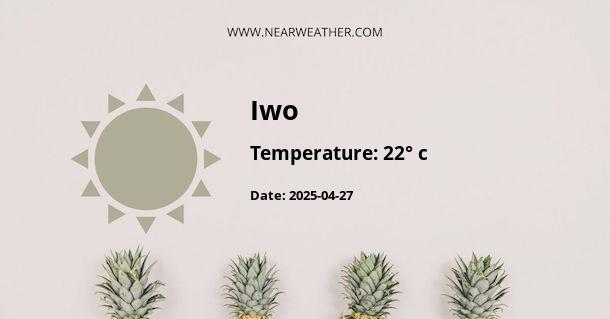The Climate and Weather of Iwo, Nigeria
Iwo is a city located in Osun State, Nigeria. It is known for its rich history, cultural heritage, and diverse climate. The city experiences a tropical savanna climate, characterized by distinct wet and dry seasons throughout the year. Understanding the climate and weather patterns of Iwo is important for residents, tourists, and businesses in planning their activities.
Temperature
Iwo experiences high temperatures throughout the year, with little variation between seasons. The average daily temperature ranges between 26°C (78.8°F) and 34°C (93.2°F). The hottest months are usually between February and April, with temperatures reaching as high as 38°C (100.4°F) during the day. The coolest months are from December to February, with temperatures dropping to around 25°C (77°F) at night.
It is important to note that the temperature can be influenced by factors such as humidity, wind speed, and cloud cover. The city experiences a moderate to high level of humidity, especially during the rainy season, which can make the temperatures feel even hotter.
Rainfall
Iwo has a distinct wet and dry season. The rainy season typically starts in April and lasts until October, with peak rainfall occurring between June and September. During this period, the city receives an average annual rainfall of around 1,500mm (59 inches). The rainfall is usually heavy, with occasional thunderstorms and showers.
The dry season in Iwo usually begins in November and lasts until March. During this period, rainfall is significantly reduced, and the city experiences dry and dusty conditions. The average monthly rainfall during the dry season is less than 50mm (2 inches).
The variation in rainfall between the wet and dry seasons influences agricultural activities in Iwo. The wet season provides favorable conditions for farming, while the dry season requires irrigation and other water management techniques.
Wind Patterns
Iwo experiences a generally calm wind pattern throughout the year, with occasional gusts during thunderstorms. The prevailing wind direction is from the northeast, with an average wind speed of around 5-10 kilometers per hour (3-6 miles per hour).
Sunshine Hours
Iwo enjoys a significant amount of sunshine throughout the year. On average, the city experiences around 8-9 hours of sunshine per day. This abundant sunlight is beneficial for agricultural activities and solar energy production.
Climate-Related Challenges
While Iwo generally has a favorable climate, it does face a few climate-related challenges. The heavy rainfall during the wet season can sometimes lead to flooding, which can cause damage to infrastructure and disrupt daily activities. It is important for residents and authorities to have proper drainage systems in place to mitigate the impact of flooding.
The dry season, on the other hand, can result in water scarcity and drought conditions. Adequate water management techniques, such as water storage and conservation, are crucial during this period.
Conclusion
Iwo, Nigeria experiences a tropical savanna climate with distinct wet and dry seasons. The city enjoys high temperatures throughout the year, with little temperature variation between seasons. The rainy season lasts from April to October, with peak rainfall occurring between June and September. The dry season occurs from November to March, with significantly reduced rainfall. Understanding the climate and weather patterns of Iwo is essential for residents, tourists, and businesses to plan their activities effectively and adapt to the challenges posed by the climate.
A - Iwo's Latitude is 7.633330 & Longitude is 4.183330.
A - Weather in Iwo is 22° today.
A - Climate Conditions in Iwo shows moderate rain today.
A - Humidity in Iwo is 94% today.
A - Wind speed in Iwo is 11.27 km/h, flowing at 228° wind direction. today.
